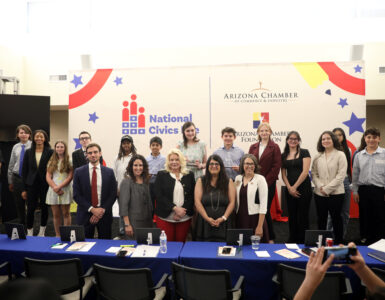Proposition 129 will make ballot initiatives more transparent and prevent special interests from inserting disparate provisions into a single initiative, according to the measure’s proponents.
The measure, which was referred to the November ballot by the state Legislature, would amend the Arizona constitution “to limit each initiative to a single subject and require that subject to be expressed in the title of the initiative measure.”
Bills proposed at the state Legislature via the regular legislative process must adhere to a single subject, as must ballot initiatives seeking to amend the state constitution. These limitations prevent “logrolling,” or lumping together several – and potentially unrelated – provisions together.
The state Legislature’s failure in the 2021 legislative session to pass budget bills that stuck to a single subject reflected in the bill title resulted in four bills being at least partially struck down by the state Supreme Court in a ruling last November.
However, ballot initiatives to amend or create state law can address more than one subject. Proposition 129 would change that, ensuring that all forms of lawmaking adhere to the single-subject rule.
Supporters of Proposition 129 include the Arizona chapter of commercial real estate group NAIOP, the Arizona Free Enterprise Club and the Arizona Chamber of Commerce & Industry.
“[A] single subject rule is a general principle of legislation. It applies across the board. It applies to our legislature, and it applies to the constitutional amendments we might want to make,” Chamber General Counsel Mike Bailey said in a recent debate broadcast on Channel 8. “What [Proposition 129] says is that if you’re going to legislate on something, if you’re going to pass a law on something, you can’t hide things that aren’t related to this topic.”
According to the National Conference of State Legislatures, 14 states that have an initiative system require that initiatives be limited to a single subject.
Opponents of Proposition 129 include the League of Women Voters Arizona, the Arizona Education Association and Living United for Change Arizona, or LUCHA.
A proposed ballot initiative in 2022 sought to make several changes to state election laws. It narrowly missed securing a spot on the November ballot due to a failure to collect enough valid petition signatures.
“It had an impact on 44 separate statutes in our state code,” Bailey said of the proposal. “It would take an expert in the area of law days to figure out the ramifications of that and it’s not realistic and it’s too many things being hidden.”
Bailey says Proposition 129 makes it more difficult for outside activists to use Arizona’s relatively open initiative system to lump several items of their agenda into one initiative.
“[Proposition 129] makes it transparent and it makes it much more difficult to hide special interest concerns.”
Arizona voters will decide the fate of Proposition 129 on Election Day, November 8.
















Add comment